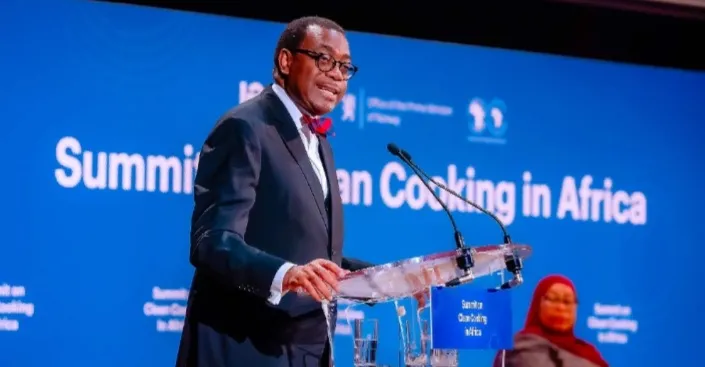By Muhammad Amaan
The African Development Bank (AfDB) said it will commit $2 billion to clean cooking in Africa over the next 10 years, to mitigate effects of secondary smoke from burning of fuel wood and charcoal.
The bank said Africa loses over 600,000 women and children annually to negative effects of secondary smoke from partial combustion of biomass, fuel wood and charcoal.
President of the AfDB, Dr Akinwumi Adesina, who disclosed this during the Summit on Clean Cooking in Africa organised by the AfDB and the International Energy Agency in Paris, France, the continent will lose six million women and children in 10 years if clean cooking is not promoted.
He said it is estimated that globally, the health cost alone from impaired health is in the order of $1.4 trillion annually, with over half of $700bn annually being in Africa.
According to him, the commitment to clean cooking represents 20 per cent of the bank’s annual financing for the energy sector.
Adesina said recent data released by the ADB, indicates that over 900 million people in Africa still lack access to clean cooking solutions and rely on woody biomass or fossil fuels.
The AfDB President said, “Access to clean cooking is more than cooking. It is about human dignity, fairness, justice, and equity for women. It is more than the lighting of the stoves; it is about life.
The imperative of clean cooking is clear and overwhelming for the environment and climate change.
Access to clean cooking will save at least 200 million hectares of forests globally, with 110 million being in Africa, by 2030.
“Universal access to clean cooking will reduce greenhouse gas emissions globally by 1.9 gigatons of C02-equivalent, which is equal to all the emissions from aeroplanes and ships today.
Providing universal access to clean cooking is right, fair, just, and the responsible thing to do.”
Dr Adesina noted that the gathering was meant for them to take decisive actions to solve the problem.
He added, “At once and for all, for women, for girls, for life, for the environment, and for dignity. The solutions for clean cooking are well known, from liquified petroleum gas, natural gas for use for electricity to allow for electric stoves or e-cooking, use of ethanol and biogas.
“We know of so-called improved clean cooking stoves, but they simply give efficiency in the use of heat for cooking but still rely on fuel wood, charcoal, or biomass. Let’s be clear: there is nothing improved in continued suffering.
“No woman in Africa should have to cook again with fuelwood, charcoal, and biomass.”
He thanked the President of Tanzania, Samia Suluhu Hassan, for establishing a national programme to solve the problem in his country, and in other parts of Africa, with the African Women Clean Cooking Support Programme, launched at COP28.
Adesina, however, urged other African governments to play their leadership role, stressing that governments must allocate at least five percent of the current total $80 billion spent on energy investments annually into the provision of clean cooking solutions, that will provide close to the $4 billion needed annually.
“It is time to restore dignity to women to cook like in developed countries. The International Energy Agency has estimated that it will cost only $4 billion per year in Africa to achieve universal access to clean cooking.”
The AfDB will play a major part in this collective effort and will now allocate 20% of all its financing for energy in Africa to clean cooking.
“I am therefore pleased to announce that the AfDB will commit $2 billion to clean cooking over the next ten years.
We will work with governments to develop and roll out clean cooking solutions at scale, along with supportive policy, standards, safety, and regulations, as well as fiscal incentives to improve access and affordability.
“We cannot solve the global clean cooking challenge unless we solve it first in Africa. Let us from today, create a spark, and trigger a movement, to assure 100 per cent access to clean cooking for women in Africa,” he appealed.
During the summit, the Norwegian Prime Minister, Jonas Gahr Store, also pledged $50 million to the cause, in the presence of 20 African heads of state and government, including the Director General of the World Health Organization, and the President of Azerbaijan, which will host the next UN Climate Change Conference.
Also, the European Union pledged 400 million pounds, which is approximately 431 million dollars.




